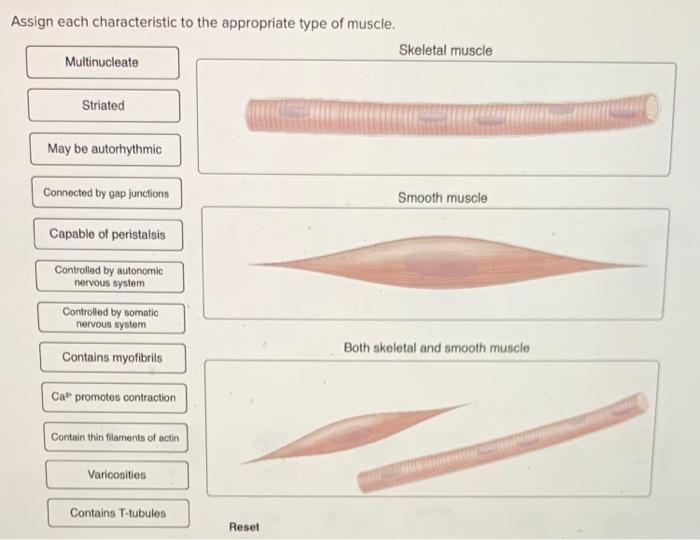Assign each characteristic to the appropriate type of muscle. – The human body is an intricate system composed of various muscle types, each possessing unique characteristics that contribute to their diverse functions. This article delves into the realm of muscle characteristics, exploring their significance and how they relate to the different muscle types found within the human body.
Muscle characteristics, such as contractility, excitability, extensibility, and elasticity, play a crucial role in determining the specific roles that muscles can perform. Understanding these characteristics and their association with different muscle types is essential for comprehending the complex interplay of the muscular system.
Muscle Types and Characteristics

Muscles are essential for movement, posture, and various bodily functions. They can be classified into three main types based on their structure and function:
| Muscle Type | Description | Examples |
|---|---|---|
| Skeletal Muscle | Voluntary muscles attached to bones that enable movement. | Biceps, quadriceps, deltoids |
| Smooth Muscle | Involuntary muscles found in organs and blood vessels that control involuntary functions. | Muscles in the digestive tract, blood vessels |
| Cardiac Muscle | Involuntary muscles found in the heart that contract rhythmically to pump blood. | Myocardium |
Muscle Characteristics
- Contractility: Ability to shorten and generate force.
- Excitability: Ability to respond to stimuli (e.g., nerve impulses).
- Extensibility: Ability to stretch without tearing.
- Elasticity: Ability to return to original shape after stretching.
Matching Characteristics to Muscle Types
| Muscle Type | Characteristic | Explanation |
|---|---|---|
| Skeletal Muscle | Contractility | Skeletal muscles are highly contractile, allowing for rapid and powerful movements. |
| Smooth Muscle | Excitability | Smooth muscles are less excitable than skeletal muscles, enabling them to maintain sustained contractions. |
| Cardiac Muscle | Extensibility | Cardiac muscles are highly extensible, allowing them to fill with blood without rupturing. |
| Skeletal Muscle | Elasticity | Skeletal muscles are highly elastic, allowing them to recoil after stretching and contribute to movement efficiency. |
Examples and Applications
- Skeletal Muscle: Used in weightlifting, running, and other physical activities.
- Smooth Muscle: Regulates blood flow, digestion, and other involuntary functions.
- Cardiac Muscle: Pumps blood throughout the body, essential for life.
Further Research, Assign each characteristic to the appropriate type of muscle.
- Investigate the role of muscle characteristics in muscle disorders and injuries.
- Explore the potential of manipulating muscle characteristics to enhance athletic performance.
- Study the effects of aging and lifestyle factors on muscle characteristics.
Question Bank: Assign Each Characteristic To The Appropriate Type Of Muscle.
What are the key characteristics of muscles?
The key characteristics of muscles include contractility, excitability, extensibility, and elasticity.
How do muscle characteristics contribute to muscle function?
Muscle characteristics determine the specific roles that muscles can perform, such as voluntary movement, involuntary contractions, and maintaining posture.
Why is it important to understand the relationship between muscle characteristics and muscle types?
Understanding the relationship between muscle characteristics and muscle types is essential for optimizing physical performance, maintaining musculoskeletal health, and advancing our understanding of human physiology.

